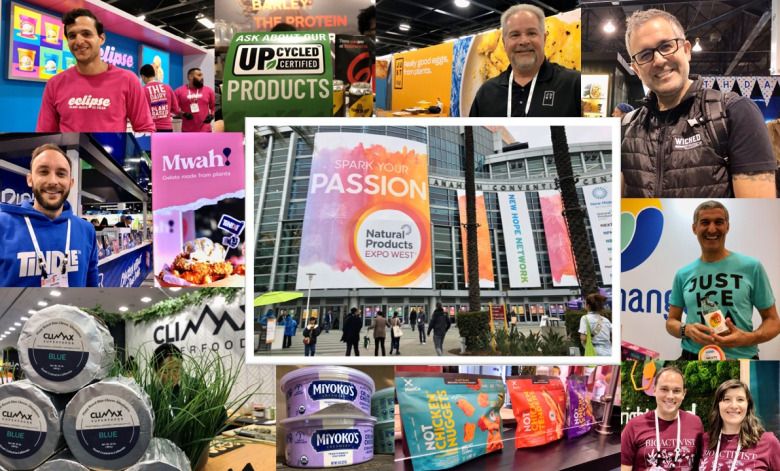In part two of our whistlestop tour of foodtech startups exhibiting at Expo West, we look at players from Brightseed, which is exploring novel bioactives for gut health, to Epogee, which has found intriguing new applications for EPG: a plant-based oil restructured in such a way that virtually none of it is absorbed by the body.
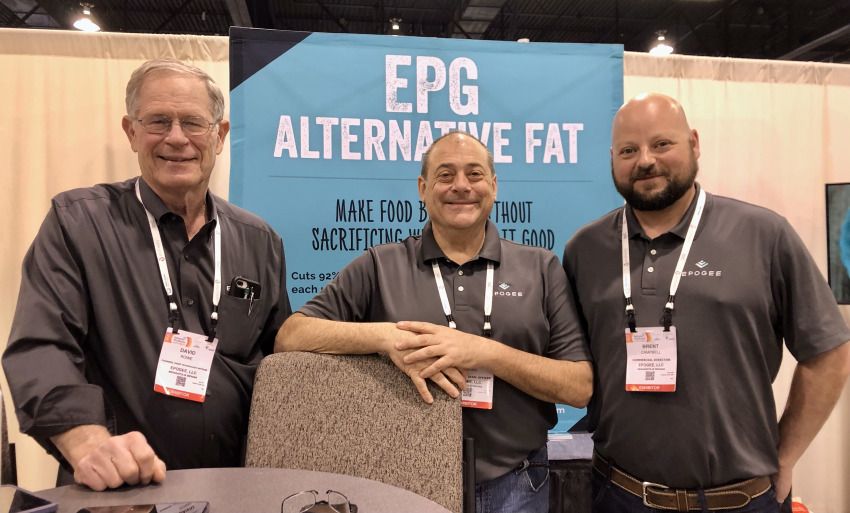
Epogee: Fat… the final frontier for meat alternatives?
EPG—a plant-based oil restructured in such a way that virtually none of it is absorbed by the body—has demonstrated intriguing properties in plant-based meat applications, where formulators have struggled to find vegan options that behave like animal fat, Indiana-based Epogee told AFN.
“Under pressure to cut trans fats, companies ended up replacing animal fats and partially hydrogenated oils with tropical fats (palm, coconut), which are high in saturated fat,” chief commercial officer Jayme Caruso (pictured center) explained.
“But there’s now a lot more conversation about alternative fats with similar properties but a better nutritional and sustainability profile, so we’re really excited about some of the collaborations we’re doing in the plant-based space.”
Because of the unique structure of the EPG molecule, the fat stays in the substrate during the cooking process and semi-solidifies, making for juicier plant-based meats. EPG also coats the mouth like animal fat, according to Epogee.
EPG (esterified propoxylated glycerol)—which is picking up customers in confectionery and snacks as a means of reducing calories and saturated fat without compromising on taste or texture—can be listed on food labels as ‘EPG (modified plant-based oil).’ It has also secured a no questions letter from the FDA regarding its GRAS status for multiple applications, said Caruso.
To make EPG, Epogee splits rapeseed oil into glycerin and fatty acid, inserts a food-grade link, and reconnects them. The modified fat (EPG) has a melting point of 102˚F, which means it doesn’t liquify when it passes through the body (typically around 98.6˚F).
EPG largely resists digestion because digestive enzymes are prevented from breaking it down, so hardly any of its calories are released, explained Caruso. To put this into perspective, 1g of fat contains 9 calories, while 1g of EPG contains 0.7 calories.
Unlike Olestra (which had a lower melting point and messy side effects) or fat replacers made from sugars, gums, starches or fibers, EPG functions like fat in food products and in the human body because it’s made from fat, he claimed.
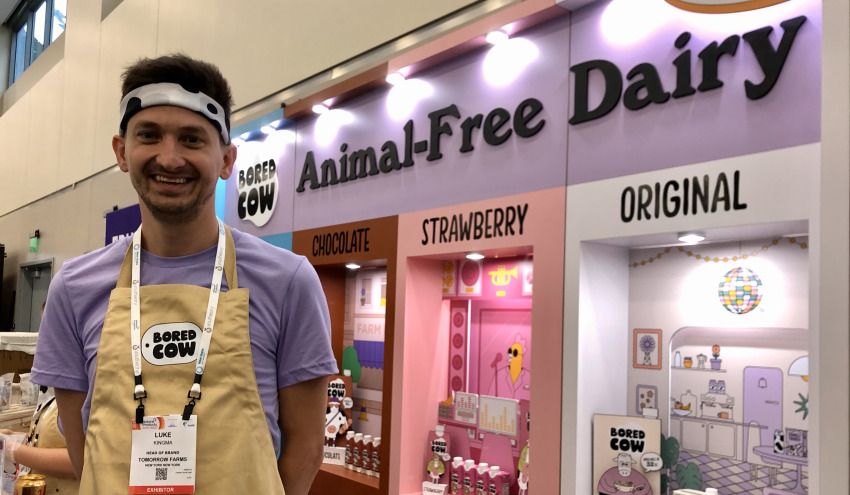
Tomorrow Farms (Bored Cow) animal-free milk to make nationwide US retail debut
One of a flurry of small brands utilizing Perfect Day’s whey protein (made by microbes, not cows), Bored Cow has 8g protein per serving (to match dairy milk) and added calcium, potassium, and vitamin D, B12, and A.
“Right now we’re selling direct to consumer with a shelf-stable product, but we’re about to launch nationally in retail next month with a well-known retailer,” Luke Kingma head of brand told AFN.
“For some people, the idea of factory farming doesn’t sit well with them while others are more environmentally minded, but plant-based milks are not meeting their expectations. So they might put oatmilk in their coffee, but they’re not cooking with it, pouring it in their cereal, or drinking it by the glass.
“I think also there’s a really powerful nutritional story here, as a lot of plant milks are nutritionally pretty empty, and we’re aligning with where the FDA is going in terms of their new draft guidance about the use of the word ‘milk.’”
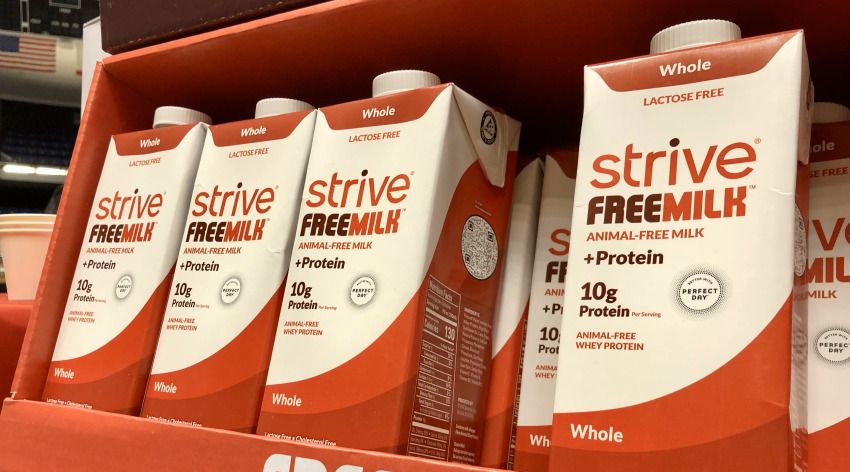
Strive Nutrition: ‘Plant-based milk options aren’t meeting everyone’s needs’
Wichita, Kansas-based Strive Nutrition is also using Perfect Day’s whey protein from fermentation in its lactose-free ‘Strive freemilk’ shelf-stable product line, which features 10g protein and 75% less sugar than regular dairy milk.
“It’s currently available in markets around Kansas,” chief revenue officer Austen Cohlmia told AFN.
“But we will be in ShopRite, Wakefern, Wegmans, and Giant Eagle from around May and coffee shops and foodservice outlets in New York. We’ve also hooked up with a broker for the Bay Area to access independent grocers there.”
So who is the consumer for animal-free milk vs plant-based milk? It varies, said Cohlmia. “Some people are focused on the nutrition compared to plant-based milks, and then there are other consumers that buy into the concept but just don’t like the taste [of plant-based milks]. Our product looks and tastes like dairy milk.”
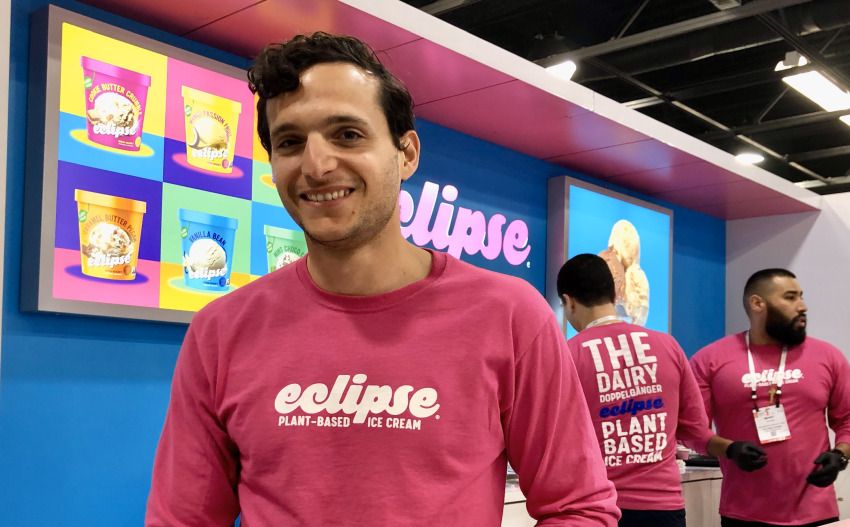
Eclipse Foods: Plant-based pints that ‘actually taste like dairy ice cream’
Founded by Thomas Bowman (CTO) and Aylon Steinhart (CEO) in December 2018, Oakland-based Eclipse Foods launched in late 2019 promising to disrupt the plant-based ice cream category with products that “actually taste like dairy ice cream.” It raised a $40m series B round led by Sozo Ventures last year.
Eclipse—which says its technology can apply to multiple dairy categories—has since picked up business with leading retailers including Whole Foods, Albertsons and Harris Teeter, and a flurry of foodservice accounts including SmashBurger, Steinhart told AFN.
“In the ice cream aisle at retail [in the US], the pendulum swung really far towards bringing in a lot of plant-based dairy products. But not all of them met retailers’ targets, so in the latest review there was some consolidation in plant-based pints, although novelties are still going strong. However, our products are performing really well. We ended the year as the #2 fastest selling plant-based ice cream in NorCal Whole Foods.”
A patent filed by Steinhart and Bowman in October 2020 lays out how they are attempting to promote micelle formation between plant proteins, starches, and oil droplets in a non-dairy liquid base that replicates the micellular structures in dairy milk whereby casein proteins fold up into spherical structures so they can remain suspended indefinitely in water along with minerals such as calcium.
“Our whole IP platform is about replicating micelles using plants, not using expensive biotech,” said Steinhart. “We figured out how to create those in our base, which allows us to create the taste, texture and functionality of dairy.”
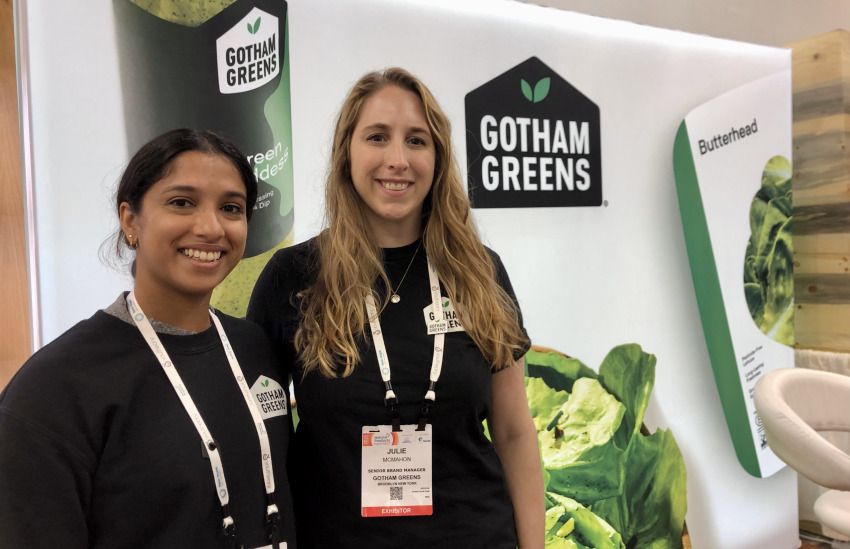
Gotham Greens: Not all indoor farming companies are the same
New York-based indoor farming firm Gotham Greens recently raised $310m in a series E round bringing its cumulative funding to $440m since 2009. While these sums are jaw-dropping, the hydroponics firm has demonstrated it can make money and deploy its investors’ capital efficiently, senior brand managers Vidushi Bhargava and Julie McMahon told AFN.
“The fact we’re using natural light is a part of it, so we don’t have the energy costs associated with vertical farming and by the end of next year, we will operate 13 commercial scale farms across the US.”
For retailers, the locally-grown products have a longer shelf-life and offer greater stability and security of supply than produce shipped from the west coast that are far more vulnerable to weather and supply chain disruptions, they added.
“They like the fact we’re using 95% less water and 97% less land, and that we’re pesticide free and local, which means we can deliver more shelf-life.”

HowGood: Building ‘the world’s largest food sustainability database’
Food and beverage companies are under increasing pressure to measure, reduce, and accurately report their social and environmental impact to comply with the EU’s corporate sustainability reporting directive. In the US, meanwhile, the Securities and Exchange Commission (SEC) is considering moves to require publicly listed companies to disclose scope three greenhouse gas emissions.
HowGood—billed as “the world’s largest food sustainability database”—is attempting to provide the data to make this possible, director of growth and innovation João Brites told AFN.
“We’re seeing a lot of companies and brands wanting to make green claims, but at the same time, there is a lot more consumer and regulatory scrutiny, so this is driving adoption of the HowGood platform among retailers, ingredients suppliers, finished goods brands and investors.”
He added: “One of the big reasons we’re seeing more interest from CPG companies [in using HowGood’s platform], is because investors are asking for this data and they don’t have it.”
HowGood’s platform is populated from two key sources of data, he said: Primary data collected by companies who have conducted lifecycle analyses on their products according to internationally recognized standards; and secondary data from peer-reviewed international research.

EverGrain upcycled barley protein unlocks new formulation possibilities for plant proteins
Backed by brewing giant AB InBev, EverGrain upcycles brewers’ spent grains into a range of value-added ingredients at a new plant in St Louis capable of churning out 7,000 tons of barley protein isolate per year.
“Anyone that tries formulating with our barley protein for the first time is surprised by its high solubility and its low viscosity, so you can mix it in water and it’ll look like an iced tea,” CEO Greg Belt told AFN.
For food marketers, meanwhile, EverGrain’s barley protein—which now comes with the Upcycled certification from the Upcycled Food Association—hits the right buttons on sustainability, which CPG companies are increasingly factoring into purchasing decisions, said Belt.
“Right now we have about 12 customer launches planned for this year, including a non-alcoholic stout with 5g of barley protein from Athletic Brewing Co.”
He added: “Plant based meat is struggling a bit, but when you look at the broader plant-based nutrition and beverages market, demand for high-quality plant protein is higher than ever.”
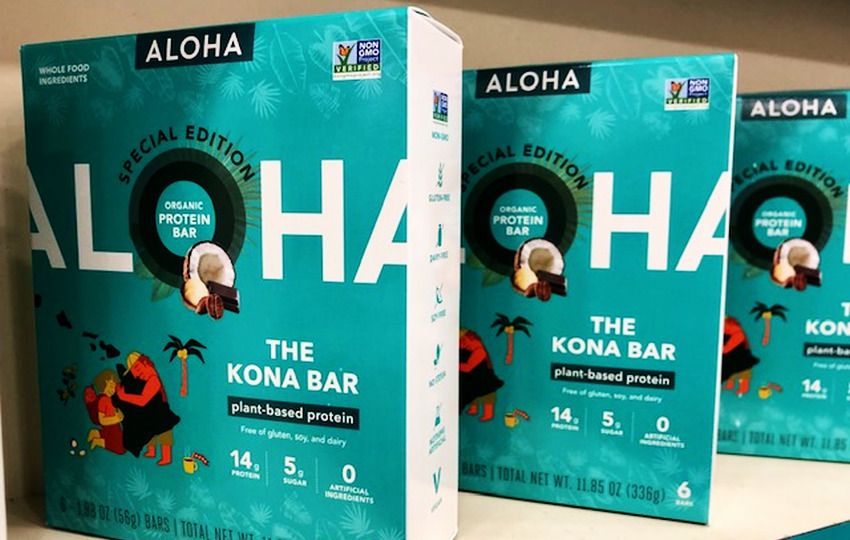
Terviva’s Ponova pongamia oil debuts in protein bar from Aloha
Aloha’s Kona bar is the first consumer product featuring oil from the pongamia tree, billed as a sustainable new source of plant-based ingredients.
A mid-oleic oil from the beans of the pongamia tree, Ponova oil has a golden color and buttery flavor with nutty notes, a slow melting curve, and a high smoke point (437 degrees Fahrenheit). It can be used as a cooking oil or an ingredient in prepared foods from meat and dairy substitutes to vegan mayo and baked goods, said Terviva, the California-based startup commercializing ingredients from pongamia beans.
Pongamia trees—sometimes referred to as ‘vertical soy’ as they produce seeds with high levels of protein and oil—have not historically been used as a food crop owing to anti-nutritional factors. However, Terviva has developed proprietary techniques that remove anti-nutritional components during processing, opening up new food and beverage market opportunities for the nitrogen-fixing crop.
As for yields, pongamia trees produce significantly more biomass per acre than soybeans with a fraction of the water, fertilizer, and pesticides, according to founder and CEO Naveen Sikka.
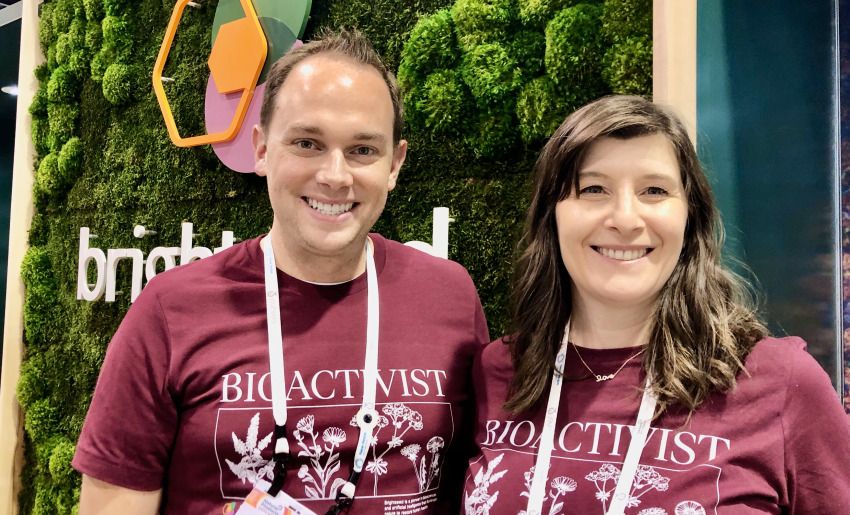
Gut barrier integrity the next big thing in gut health, says Brightseed
Brightseed, a San Francisco-based startup using artificial intelligence (AI) to identify hitherto unexplored bioactives in plants, was showcasing a new upcycled fiber from hemp hulls shown to maintain gut barrier integrity. And this could unlock new markets in gut health, director of marketing Jordan Miller told AFN.
The bioactives—N-trans-caffeoyl tyramine (NCT) and N-trans-feruloyl tyramine (NFT)—“work in a different way from probiotics, prebiotics, and postbiotics, which generally impact the gut microbiome,” he added.
“The data around NCT and NFT and gut barrier integrity is pre-clinical, so a brand wouldn’t be able to make a structure function claim on that yet, but we think gut barrier strength is really what’s next in gut health.”
The intestinal barrier is a semi-permeable layer of cells that allows the uptake of essential nutrients and immune sensing, but keeps out pathogens and unwanted bacteria, explained Alina Slotnik, VP of Bioactives.
“Keeping your gut barrier strong is an underappreciated aspect of health that I think is something consumers can intuitively understand. The feedback [for Brightseed’s fiber] has been resoundingly positive and we have a number of customers actively formulating with it.”
On a more practical level, added Slotnik, “This fiber works really well in bars because it doesn’t have water-holding properties, so it helps them stay moist longer. It also doesn’t gel within formulations, which can make bars stick to packaging.”

